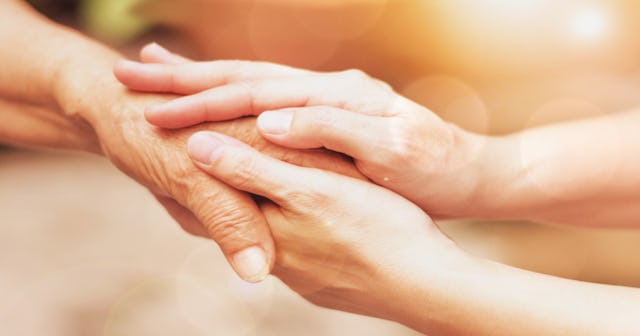What A 'Death Doula' Is – And Why Elvis’ Granddaughter Is Becoming One

Chances are high that you’ve heard the word doula. Chances are even higher that you heard that word in relation to pregnancy and labor, to describe a person who helps usher a new life into the world. But there’s another kind of doula that you’re likely not familiar with, though it’s becoming a more mainstream topic: death doula.
One of the first times I came across the term death doula in mainstream media was in Jodi Picoult’s recent novel, “The Book Of Two Ways.” In that novel, the main character works as a death doula and supports a family navigating a member’s terminal diagnosis. More recently in the news, Riley Keough, daughter of Lisa Marie Presley, granddaughter of Elvis Presley, posted about her journey to become a death doula after she lost her brother, Benjamin, to suicide less than a year ago.
Death Doulas Help With The Process of Dying
To put it simply, death doulas help patients near the end of their lives and their families usher in death. They can provide guidance and resources when it comes to wills and advanced directives; they can coordinate legacy projects and memorials to be left behind for family; and mostly importantly, they provide emotional, physical, and spiritual support to those who need it most. Sometimes, their work is as simple and as complicated as sitting vigil with a patient.
“We journey with the person who’s dying and their family to help them navigate through the whole end-of-life process,” Janie Rakow, president of the International End of Life Doula Association (INELDA) based in Jersey City, New Jersey, told USA Today.
They are hired by patients or their family members after a terminal diagnosis, and stay through the death of the patient and beyond, if needed, Rakow told USA Today.
Death Doula Certification Is Recommended
As of now, the death doula industry is unregulated, but there are certifications available. The International End of Life Doula Association (INELDA) is a nonprofit organization founded in February 2015 that offers doula certification. The program is open to anyone, even those who have no prior clinical training. However, they do caution that anyone who has suffered a loss should wait at least a year after their loss before beginning their death doula work.
According to their website, their training covers a number of topics, including the signs and symptoms of death, creating a legacy, planning the vigil, active dying, guided imagery, and grief work.
Riley Keough completed her certification course, The Art of Death Midwifery, through Sacred Crossings. According to the website, “Death Midwifery combines the roles of death doula, spiritual counsellor, end-of-life caregiver, home funeral guide and celebrant.” The three-level, 75-hour certification program consists of three intensive weekends, alongside separate written and practical assignments.
Riley Keough’s Death Doula Work Is Important
Folks come to death doula work for a variety of reasons, including after suffering through a loss of their own, as in the case of Riley Keough. Riley’s brother, Ben, died on July 12. He was only twenty-seven years old. In a post, she describes him as her best friend, twin soul, and protector. She has taken the heartache and grief evident throughout her Instagram and channeled it into work that will benefit countless others.
She writes, “We are taught that [it’s] a morbid subject to talk about. Or [we’re] so afraid of it that we’re unable to talk about it… then of course it happens to us, and we are very ill prepared. I think it’s so important to be educated on conscious dying and death the way we educate ourselves on birth and conscious birthing.”
Conscious dying means approaching death with eyes open, with intentionality. It’s defined by livingdying.org as “the process of utilizing the dying process as an opportunity to become more present and loving, an opportunity for profound healing, for spiritual awakening.”
Death is an uncomfortable topic. Talking about death is taboo, acknowledging that death exists feels morbid. I know from personal experience. Even after my husband was diagnosed with terminal brain cancer, and even after the doctors told me he had weeks left to live, I didn’t feel comfortable speaking about his death. As if not speaking or thinking about it could prevent it from happening. As if acknowledging death somehow willed it to happen faster. But, the truth is that death is an inevitability, and by not talking about it, we didn’t prevent it from happening. He still died, and we missed out on so many valuable conversations, valuable experiences.
Approaching death with intentionality is not morbid; it’s not asking for death. But it is a choice to approach death the same way we approach most other things in life: with awareness and purpose. Death doulas can help you or a loved one do just that.
This article was originally published on